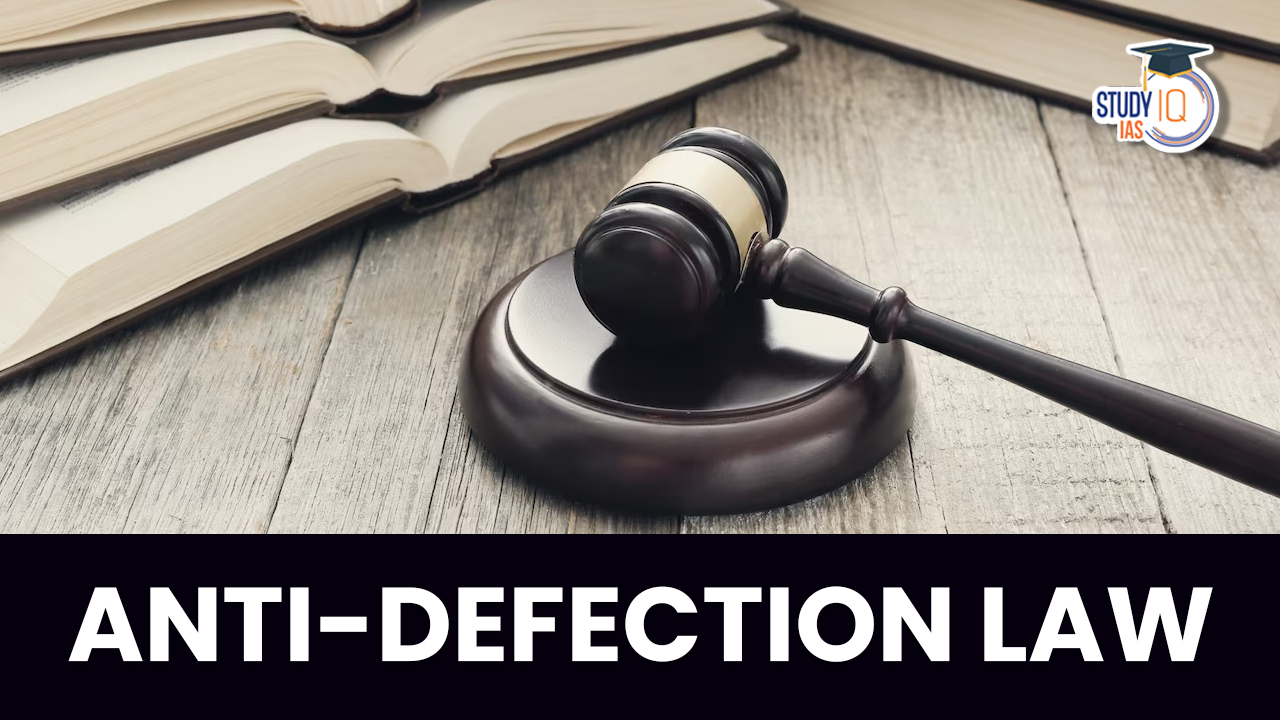Table of Contents
Context: Maharashtra Assembly Speaker Rahul Narwekar has said that he needs to decide which actions of the rebel MLAs are illegal or unconstitutional before he can take any further action. He will present his decision to the Supreme Court, which will then decide how to proceed. The delay in deciding the case has led to criticism from the Supreme Court. Last month, the Supreme Court directed Mr Narwekar to spell out the timeline for adjudication of the disqualification petitions.
Anti Defection Law
The 52nd Amendment Act of 1985 added the 10th Schedule to the Indian Constitution, which includes the Anti-Defection Law. In democracies, it is common for legislators to switch parties, which can destabilize the ruling government. To address this, India introduced the anti-defection law in 1985, added to the Constitution as the Tenth Schedule. The main goal of this law is to promote stability by discouraging lawmakers from changing parties, especially during critical times. The law disqualifies elected members who join another political party, helping to maintain government stability.
Anti Defection Law Meaning
The Indian Anti-Defection Law is part of Schedule 10 of the Indian Constitution. It removes MPs and MLAs from their positions if they leave their party. The speaker of the House has the power to manage defection cases. This law was added to the Constitution in 1985 through the Fifty-Second Amendment Act, when Rajiv Gandhi was Prime Minister. It applies to both Parliament and state legislatures.
Anti-Defection Law Origin
The Indian Constitution’s 10th Schedule, which penalizes individual Members of Parliament (MPs)/MLAs who defect from one party to another, serves as an example of the anti-defection law. The phrase “Aaya Ram Gaya Ram” became well-known in the Indian political sphere in 1967 after Gaya Lal, a Haryana MLA, switched parties three times in a single day.
Frequent defections of elected and nominated party members made good governance hard and made it difficult for the state and federal governments to function. The need for an anti-defection measure was critical to preventing similar political resignations.
Therefore, Rajiv Gandhi, the Prime Minister of India at the time, proposed a plan to reduce the risks of desertion. The Constitution was amended to include it by the Fifty-Second (Amendment) Act of 1985. The 52nd Amendment to the Indian Constitution, which took effect in 1985, included and put into effect the Anti Defection Law, also known as the 10th Schedule of the Indian Constitution.
Anti-Defection Law Provisions
The Indian Constitution’s 10th schedule contains a number of suggestions for new laws. Under the anti-defection law, MLAs and MPs can be disqualified for the following reasons:
- If they voluntarily leave their party.
- If they vote or abstain against their party’s position.
- If a nominated member joins another party after six months.
- If an independent member joins a political party.
The Speaker or Chairman of the House decides on disqualification, and their decision is final. However, the Supreme Court of India has stated that legislators can challenge their disqualification in higher courts.
Anti-Defection Law Feature
Three situations in which a member of parliament or the legislature switches political parties are covered by India’s anti-defection law:
Voluntary surrender
The first occurs when a representative elected on the platform of a political party “voluntarily” leaves that party or votes in the House against the wishes of that party. These individuals are removed from their seats.
Independent participants
When an independent candidate wins a seat in the legislature and then joins a political party. Every time a legislator joins (or leaves) a political party, their seat in the legislature is forfeited.
MPs who have been nominated
They are legally allowed to join a political party six months after being selected. They risk losing their position in the House if they join a party afterwards.
Anti-Defection Law and 10th Schedule of Indian Constitution
The Anti Defection Law seeks to maintain political stability by punishing officials who switch political parties. Anti-defection legislation also seeks to foster a sense of loyalty and connection among political party members. This is achieved by making sure that MPs chosen on the basis of a political party’s reputation, base of support, and platform uphold that party’s principles.
- 7th Schedule of Indian Constitution
- 6th Schedule of Indian Constitution
- 5th Schedule of Indian Constitution
Anti-Defection Law Challenges
Challenges are also presented by restrictions on politicians’ access to other parties. Look at the issues below for a list of the difficulties with the Anti-Defection Law. By stifling disagreement among party members, it violates the members’ right to freedom of speech and expression.
The member’s ability to serve as a productive legislator is likewise hampered by this law. Restricts switching allegiances, which lowers the accountability of the government. An individual who has a party position as a senator of the parliament is reduced to a simple voting entity in the House of Representatives.
Anti-Defection Law Committees
The Anti-Defection Law has established a number of committees. Review the recommendations made by each committee to better comprehend the law.
Dinesh Goswami Committee on Electoral Reforms (1990): Exemptions should only apply when a member (a) voluntarily resigns and leaves their political party, or (b) stops voting or votes against their party in a confidence or no-confidence motion. The Election Commission believes that the President or Governor should make the decision about disqualification.
Law Commission (170th Report, 1999): Disqualifying provisions that are protected from mergers and splits should be eliminated. Pre-election electoral fronts should be recognized as political parties under anti-defection legislation. Political parties should reserve the use of whips for emergencies where the safety of the government is at risk.
Election Commission: The President or Governor should follow the Election Commission’s advice when making important decisions mentioned in the Tenth Schedule. People who switch parties should not be allowed to hold public office or any well-paying political job for the rest of their term. Additionally, any vote by a defector to remove the government should be considered invalid.
Haleem Committee (1998): It asked that the phrases “political party” and “voluntarily giving up political party membership” be adequately defined. There will be some limitations put in place, such as maybe forbidding expelled members from taking posts in the government.
Constitution Review Commission (2002): For the balance of their term, the committee proposed prohibiting the defectors from holding any public office or other political post. A defector’s vote to overthrow the government should be deemed invalid.
Anti-Defection Law Importance
The anti-defection law helps keep political parties stable and reduces corruption within them. It encourages parties to work together and avoid defections, which helps prevent political apathy. This law encourages lawmakers to act responsibly by fining and punishing those who leave their party. It promotes loyalty among party members and supports overall political stability. By preventing divisions and defections, the anti-defection law benefits the country’s development and governance.
Anti-Defection Law Amendments
A few changes could improve the Anti-Defection Law. The Election Commission of India suggested that the President or Governor should decide on disqualifying members, rather than the speaker. It was also recommended that an independent authority be created for this purpose. Additionally, political parties should practice democracy within their own ranks to truly support democracy outside.
- In 2003, the anti-defection law was amended to allow for the merger of political parties. This means that if two or more political parties merge, the elected members of those parties will not be disqualified.
- In 2019, the anti-defection law was amended to allow for the expulsion of elected members from their political parties. This means that if a political party expels a member, the member will be disqualified from the House.
Anti-Defection Law UPSC
The Tenth Schedule to the Indian Constitution, or the anti-defection law in India, was enacted to address the perceived issue of instability brought on by democratically elected legislators in India’s Parliamentary System of Government switching allegiances from the parties they supported during the election or disobeying their parties’ decisions during crucial moments, like during voting on an important resolution.


 Revised Detention Policy Implemented by ...
Revised Detention Policy Implemented by ...
 Linking Aadhaar with Voter ID Endangers ...
Linking Aadhaar with Voter ID Endangers ...
 Article 142 of Indian Constitution, Sign...
Article 142 of Indian Constitution, Sign...





















